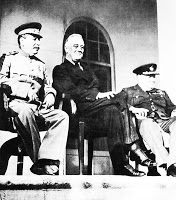 As Rothschild ‘approved’ biographer Niall Ferguson states; “If there was a single ‘secret’ of Rothschild success it was the system of co-operation between the five houses, which made them when considered as a whole, the largest bank in the world, while at the same time dispersing their financial influence in five major financial centers spread across Europe [3]. This must have caused a difficult paradox for the leaders of these countries, as their national interests might not necessarily have coincided with the aims of their central bankers!
As Rothschild ‘approved’ biographer Niall Ferguson states; “If there was a single ‘secret’ of Rothschild success it was the system of co-operation between the five houses, which made them when considered as a whole, the largest bank in the world, while at the same time dispersing their financial influence in five major financial centers spread across Europe [3]. This must have caused a difficult paradox for the leaders of these countries, as their national interests might not necessarily have coincided with the aims of their central bankers!
UNITED STATES
Prior to the American Civil War of 1861-65, the USA did not have a central bank, because in 1836 President Andrew Jackson had vetoed the renewal of the charter of the 2nd Bank of the USA, which also had Rothschild influence, “under the surface … law records show that they were powers in the old Bank of the United States.” [4] (In 1835, there had been an attempt made to assassinate President Jackson).
The House of Rothschild, in an attempt to become more financially dominant in the USA, endevoured to create an opportunity for change as per the Hegelian dialectic; financing the French and English to support the South prior to and during the War [antithesis] against the North, which received support from the Tsar of Russia [thesis], hoping to change the existing order upon which they could then capitalize [synthesis]. [5] (During the Civil War, Thomas House — father of Colonel Edward Mandell House who would later advise Presidents Woodrow Wilson and Franklin Delano Roosevelt — was an important Rothschild ally running supplies to the South.[6])
During the American Civil War, President Abraham Lincoln’s government printed ‘greenback’ dollars in trust, (not backed by gold), to finance the North’s war effort. Russian Tsar Alexander II supported Lincoln and the North by sending his imperial fleet to New York and San Francisco. After the War and his re-election, Lincoln was assassinated on April 14, 1865.
Lincoln’s ‘greenbacks’ stayed in circulation, though their value was unstable, until Congress passed the Specie Redemption Act in 1875 confirming that these ‘greenback’ dollars would be accepted at par for gold. This illustrated that the United States government was not yet controlled by a private central bank.[7]
Following the Civil War in 1867, the House of Rothschild established the Kuhn and Loeb bank in New York. This bank, which was headed by Jacob Schiff, (until his death in 1920), played the leading role for Rothschild ambitions in the United States,[8] and it also financed anti-Tsarist activities in Russia. In the 18th century, the Schiff and Rothschild families had shared a double house in Frankfurt.[9] By the late 19th century J.P. Morgan had also become an important House of Rothschild banking agent in America.[10]
 Franklin Delano Roosevelt’s family roots in America extend back into the mid 17th century when the wealthy Dutch Delano and Rosenfeldt (Roosevelt) families came to New Amsterdam (Manhattan) looking to increase their opportunities in commerce. By the 1880s, these families were well established in New York’s financial, political and social scenes and this offered Franklin (born January 30, 1882) all of the benefits that come with being born into a patrician family: money, education, and connections. [Teddy Roosevelt (U.S. President 1901-08) was a 2nd cousin, and wife Eleanor was a 5th cousin of Teddy’s, once removed.] Until 14, young Franklin was home schooled, later graduating from Harvard with ‘gentleman’s Cs’. He utilized his connections to find work as a lawyer on Wall Street in 1908, and his political ambitions first met success when he was voted Senator from New York State in 1911. Many of FDR’s supportive connections were made after October 11, 1911, when he was initiated into Freemasonry at Holland Lodge #8 in New York. [He would become a 32 degree mason and Shriner, according to Professor Johan von Leers, The Power Behind the President, Stockholm, 1941, p 148.] [11]
Franklin Delano Roosevelt’s family roots in America extend back into the mid 17th century when the wealthy Dutch Delano and Rosenfeldt (Roosevelt) families came to New Amsterdam (Manhattan) looking to increase their opportunities in commerce. By the 1880s, these families were well established in New York’s financial, political and social scenes and this offered Franklin (born January 30, 1882) all of the benefits that come with being born into a patrician family: money, education, and connections. [Teddy Roosevelt (U.S. President 1901-08) was a 2nd cousin, and wife Eleanor was a 5th cousin of Teddy’s, once removed.] Until 14, young Franklin was home schooled, later graduating from Harvard with ‘gentleman’s Cs’. He utilized his connections to find work as a lawyer on Wall Street in 1908, and his political ambitions first met success when he was voted Senator from New York State in 1911. Many of FDR’s supportive connections were made after October 11, 1911, when he was initiated into Freemasonry at Holland Lodge #8 in New York. [He would become a 32 degree mason and Shriner, according to Professor Johan von Leers, The Power Behind the President, Stockholm, 1941, p 148.] [11]
When Woodrow Wilson took office in 1913, he offered FDR the position of Assistant United States Secretary to the Navy which was quickly accepted, and his New York Senate seat was resigned. FDR would hold this position through World War I until the end of Wilson’s presidency, advancing objectives of the Democratic Party supporters. FDR’s connections would prove advantageous. When he was rebuked by Congress for his part in the Newport US Navy homosexual entrapment scandal in the spring of 1920, he escaped unscathed. Later that same year he was on the Democratic Party’s ticket as Vice-Presidential candidate with Presidential candidate Ohio Governor James Cox.
Notes:
[7] Epperson, R. A., The Unseen Hand, Publius Press, Tucson, 1990, p 163
[8] Mullins E., The Secrets of the Federal Reserve, Bankers Research Institute, Staunton VA, 1993, p 87
Toomas Trei was born in Sweden in 1950 to parents who escaped when the Communists occupied Estonia. His mother always said ‘don’t believe everything that is written about history’.
linkwithin_text=’Related Articles:’



Be the first to comment on "The Global Bankers’ FDR: A Communist Fellow Traveller (part 1 of 5)"